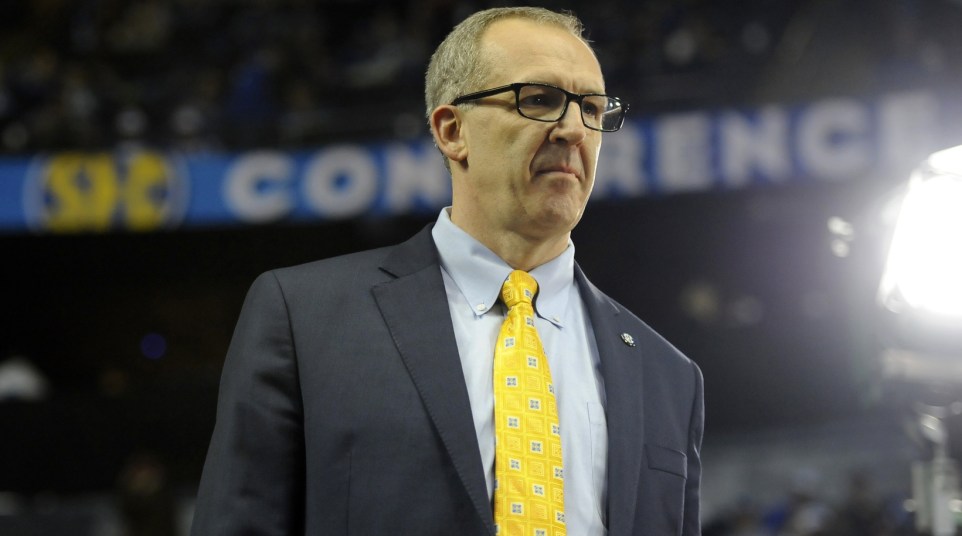What should the SEC do about satellite camps?
NCAA bylaws prevent college football coaches from hosting football camps unless they’re on campus, within the same state as the university or out of state within a 50-mile radius of campus.
There is, however, a loophole: it’s possible to “guest coach” at someone else’s camp. Unless you’re a member of the SEC, which explicitly bans that loophole.
The Big Ten, however, does not bar use of “satellite camps” in recruiting.
If it seems like that conference has adapted an SEC mindset when it comes to recruiting, that’s because it’s reality. Coaches like Urban Meyer (Florida to Ohio State) and James Franklin (Vanderbilt to Penn State) took notes when, for instance, Alabama’s Nick Saban exploited recruiting loopholes by oversigning or the use of video conference calls.
Those two schools, along with Michigan and new coach Jim Harbaugh, are invading the South during the summer months, bopping around Alabama, Georgia and Florida as “guest coaches” at high school football camps. Harbaugh even set up shop in Prattville, Ala., prompting Saban to call the use of satellite camps “ridiculous.”
The NCAA may or may not close the loophole on these satellite camps this summer. Meantime, no matter how ridiculous it may be, the SEC is at a recruiting disadvantage.
If Saban could set up shop in Columbus, Ohio, for a high school camp, and interact with four-star running back Demario McCall (Buckeyes commitments), would he turn it down? Would four-star outside linebacker Daelin Hayes of Ann Arbor, Mich., turn down the opportunity to work with Gus Malzahn and Will Muschamp at a June camp 5 miles from his house?
Recruiting among the country’s best programs — with some relative exceptions for schools in California, Texas and Florida — long since has become a national endeavor. Any edge is a good edge when you’re competing with the best conferences across the country for the same talented prep athletes.
Franklin was the first Big Ten coach to take advantage of the loophole, serving as a guest coach in Georgia and Florida last year. But Harbaugh and Michigan have been the loudest and most bothersome to SEC programs.
UM’s nine-stop “Football Summer Swarm Tour” has gotten all sorts of publicity. Harbaugh even sent out an open invitation to all college football coaches to serve as a keynote speaker at the University of Michigan’s football camp in a clear poke at the SEC.
His “Exposure U” camp will include Colin Kaepernick, Jay Cutler, Denard Robinson, Jameis Winston, Elvis Grbac, George Whitfield, Blaine Gabbert, Kyle Boller and more. The quarterback-friendly camp will feature the first-ever “QB cage match.”
Harbaugh has dubbed the event “Ann Arbor’s Aerial Assault,” and it’s a wonderful and unique opportunity for regarded high school quarterbacks.
It’s not like members of the SEC are shaking in their boots — or visors — from this Big Ten blitz. But Ohio State does hold the distinction as the only school to have won the College Football Playoff. The Wolverines should be a national contender within a few years. And Penn State, Michigan State, Nebraska and Wisconsin make for strong potential programs on any given year as well.
ACC commissioner John Swofford has aligned himself with big-time SEC coaches.
“Right now we intend to keep our conference agreement [with the SEC] as is and push for a national rule that prohibits it,” Swofford told ESPN.com.
“We just don’t feel like it’s a healthy part of the recruiting process in college football. We may have to ultimately reconsider it if the rules continue to allow it, because we’re not going to put ourselves at a competitive disadvantage in recruiting if we were to feel like we were disadvantaged, but our primary purpose right now is to try to gain support for a national rule that prohibits it.”
College programs already spend millions of dollars on recruiting. Assistant coaches spend many months jet-setting around the country. I’m not sure we really want big-time college football coaches being required to fly across the country giving clinics at numerous high schools every offseason in an effort to stay relevant.
Greg Sankey, who will be installed as the next SEC commissioner in a few months, and the rest of the league’s power brokers will discuss the rule during the annual meetings in Destin, Fla., in the next few weeks. The SEC must decide: will it amend conference bylaws so that its own coaches can follow suit? Or will it try back-channel politics to raise support among other conferences for closing the NCAA loophole?
It may seem like a minor issue. That’s correct, within a certain prism. But conferences now essentially are parent companies of mega corporations worth hundreds of millions of dollars. For better or worse, college football is a scorched-earth business.
Preferably, the SEC can raise support behind the scenes to get the rule amended by the NCAA, or at least convince the other power conferences to adapt the same loophole-closing bylaw. But no matter how “ridiculous” satellite camps may seem, or how minor of an advantage, the SEC must protect its business. That means putting a plan in place to allow SEC coaches to conduct satellite camps of their own starting in 2016.
Such a power play may even force the Big Ten to go begging the NCAA to shut down the loophole. After all, the SEC remains king of the recruiting world. Given carte blanche to conduct satellite camps, the conference surely would outdo anything the Wolverines or Nittany Lions are putting together, flipping the advantage 180 degrees.
Whatever happens, don’t expect satellite camps to be a viable option in five years. It seems likely that one conference or another eventually will make a move that forces a shutdown.

